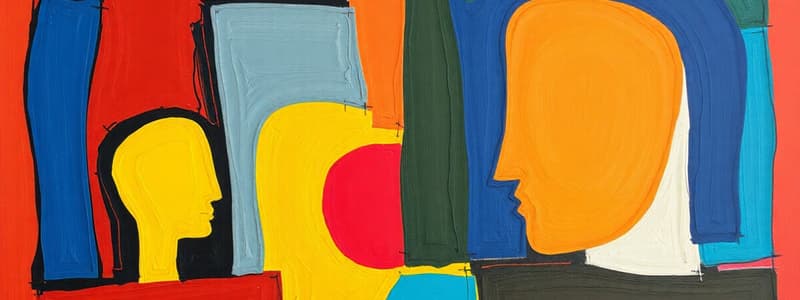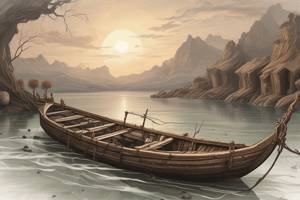Podcast
Questions and Answers
What defines a literary genre according to the content?
What defines a literary genre according to the content?
- The historical context of the text
- The characteristics common to a group of texts (correct)
- The emotional response of the reader
- The narrative style used by the author
Which of the following is NOT classified as a literary genre by Tzevan Todorov?
Which of the following is NOT classified as a literary genre by Tzevan Todorov?
- Realistic
- Fantastic
- Scientific (correct)
- Marvellous
How do characters react in a realistic genre?
How do characters react in a realistic genre?
- They question the social order
- They behave in an unexpected manner
- They react as the reader might expect (correct)
- They accept the supernatural occurrences without surprise
What is a defining feature of the strange genre?
What is a defining feature of the strange genre?
Which genre suggests moral implications in its narratives?
Which genre suggests moral implications in its narratives?
What reaction do characters have in the marvellous genre towards events?
What reaction do characters have in the marvellous genre towards events?
Which literary genre is primarily concerned with questioning social order?
Which literary genre is primarily concerned with questioning social order?
What type of resolution is expected in the realistic genre?
What type of resolution is expected in the realistic genre?
Flashcards
What is a genre?
What is a genre?
A genre is a category of creative works that share common characteristics and conventions. These characteristics are repeated across different texts, regardless of author, and define the genre.
What is the fantastic genre?
What is the fantastic genre?
The fantastic genre involves stories where the characters react with surprise and uncertainty to events that challenge the natural order of the world. The reader is left to question the nature of reality itself.
How did Todorov classify literary genres?
How did Todorov classify literary genres?
Tzevan Todorov identified four literary genres: realist, strange, fantastic, and marvelous. His classification focuses on the characters' reactions to events, defining the type of universe they inhabit and the resulting reader experience.
Realist Genre
Realist Genre
Signup and view all the flashcards
Strange Genre
Strange Genre
Signup and view all the flashcards
Fantastic Genre
Fantastic Genre
Signup and view all the flashcards
Marvelous Genre
Marvelous Genre
Signup and view all the flashcards
What does the conflict depict?
What does the conflict depict?
Signup and view all the flashcards
Study Notes
Genre of Fantastic Literature
- Fantastic literature is a genre characterized by specific characteristics appearing repeatedly in various texts, regardless of the author.
- It's distinguished from other genres through the perspective on reality, modes of storytelling, and the presence/absence of realism.
- Tzevan Todorov, a Bulgarian linguist and philosopher, identified four main literary genres: Realistic, Strange, Fantastic, and Marvelous.
Todorov's Classification
- Realistic: Events and reactions are expected, similar to actions in everyday life.
- Strange: Events occur that challenge typical expectations ("out of the ordinary"), but they are still explicable with logical explanations.
- Fantastic: Events appear unexplainable with existing knowledge and logic. Reactions from the characters can vary and can change the perception of reality to the reader.
- Marvelous: Events defy any kind of natural explanation and are accepted as part of the narrative.
Key Elements for Genre Classification
- Characters' Reactions: Todorov's analysis primarily focused on the characters' reactions to supernatural events or inexplicable situations in the text.
- Event Likelihood: The likelihood of events occurring in our everyday world is essential to determine if the narrative fits a particular genre.
- Logical Explanation: Exploring whether the narrative allows for a logical, rational explanation of the bizarre events is crucial.
- Reader's Perceptions: Reactions and implications for understanding the world portrayed in the text affect readers' emotional responses.
Studying That Suits You
Use AI to generate personalized quizzes and flashcards to suit your learning preferences.




